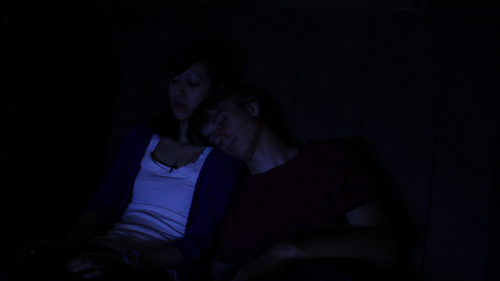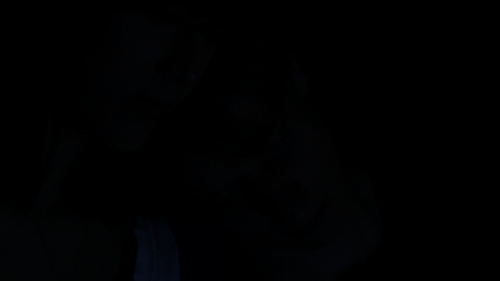Why You Want a Monitor On Set
Here is an un-corrected A-Camera still from the scene I’m working on right now:

Obviously it’s too bright (this scene takes place at night, in the dark), but that’s easy to correct. Going darker is not a problem; in fact, we shot it this way on purpose. I’m not going to comment about the blue tint. That’s not the point.
Now, here is another, also un-corrected still, from the same scene, and in fact the same moment in time, but from our B Camera:

In case I wasn’t clear above, these shots were simultaneous; we were shooting multi-camera. The compression on this image makes it look a tiny bit worse than it really is, but you get the point.
Now, the two cameras we used were different models–similar, even down to the sensor inside them, but not the same. One of them had a few stops more latitude than the other, which probably explains the difference. This is a limitation we just had to deal with. The proper way to deal with it in this situation would have been to throw more light at the scene and lower the ISO on Camera A.
But we didn’t do that. Why?
Because I didn’t realize what was happening. You’ll hear me singing that song a lot (here, for example) about this movie, because everyone was doing too much, including me, and we were all exhausted most of the time. I lost track of hundreds of tiny problems that should have been noticed and resolved. This one isn’t quite as tiny.
See, I can fix this, but the B-Camera shots will get grainier. It’s way harder to go lighter on digital footage than darker. So when you eventually watch this movie, look for the disparity, because unless I discover some sort of magic previously unknown to me, there will certainly be disparity.
If I’d had a monitor with us on set I would have looked at it, and I would have noticed. In fact, we did have a monitor on the show, but making sure it followed the cameras around and got hooked up every time we moved so that I could look at it to check on what my camera ops were doing was another one of those tiny things that didn’t get done because it wasn’t anyone’s job, in particular. Welcome to no-budget indie production.
My friend Greg would probably favor me with a regretful shake of his head right now if I was talking to him about this, and David O’Donnell would graciously refrain from pointing out that he warned me I’d need an AD on set, because he’s a classy guy. But their point would essentially be made: you’re going to make mistakes like this, and they’re going to bite you later, and hopefully if you’re smart, you’ll not make the same ones again.
If you’re smart.